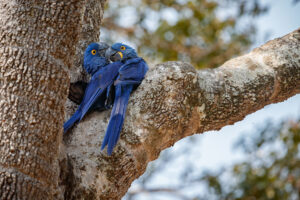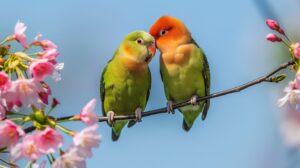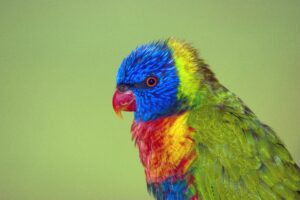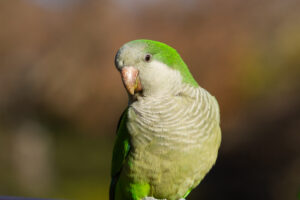Introduction
The umbrella cockatoo parrot stands as one of the most striking and charismatic birds in the avian world. With its impressive white plumage and distinctive yellow-tinged crest that fans out like an umbrella when excited, this magnificent creature captivates the hearts of bird enthusiasts across the United States. However, behind those expressive eyes and charming personalities lies a complex pet that requires serious consideration before bringing home.
Many potential bird owners are drawn to the umbrella cockatoo for its intelligence, affectionate nature, and impressive talking abilities. Yet, for every heartwarming video of an umbrella cockatoo dancing or saying “I love you,” there are countless stories of overwhelmed owners struggling with the realities of caring for these demanding birds.
This article will explore six hard truths about the umbrella cockatoo parrot that every prospective owner should understand, covering everything from the umbrella cockatoo price and lifespan to their specific care requirements and behavioral challenges. Whether you’re considering an umbrella cockatoo for sale or simply curious about these fascinating birds, prepare for an honest look at what umbrella cockatoo ownership truly entails.
Hard Truth #1: Umbrella Cockatoos Are a Lifetime Commitment
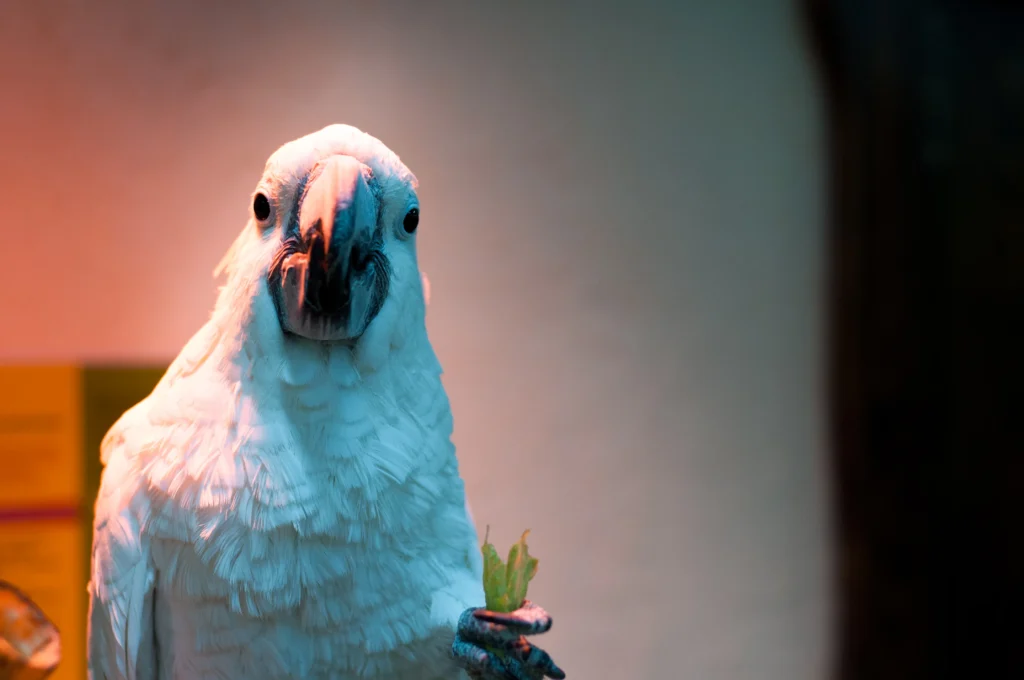
When discussing the umbrella cockatoo lifespan, the numbers can be shocking for first-time bird owners. These aren’t pets that will be with you for a few years—they’re companions for decades.
The Surprising Umbrella Cockatoo Lifespan
The umbrella cockatoo parrot can live between 60-80 years in captivity with proper care. This extraordinary lifespan means that bringing an umbrella cockatoo into your home is not just a pet purchase—it’s potentially a multi-generational commitment.
Many umbrella cockatoos outlive their owners, which creates significant ethical concerns regarding their long-term care. Before considering an umbrella cockatoo for sale, ask yourself:
- Who will care for this bird if something happens to me?
- Am I prepared to include this pet in my estate planning?
- Can I provide consistent care for potentially 60+ years?
According to the American Federation of Aviculture, rehoming is a significant issue with long-lived parrots like the umbrella cockatoo. Many of these birds will have multiple homes throughout their lives, which can be traumatic for such intelligent and emotionally sensitive creatures.
The umbrella cockatoo’s extraordinary lifespan means that adopting one should be considered with the same seriousness as any other major life decision. These are not impulse purchases, regardless of how charming they may appear when you see an umbrella cockatoo for sale.
Hard Truth #2: The Real Cost of an Umbrella Cockatoo
The umbrella cockatoo price can be substantial, but the initial purchase cost is just the beginning of a financial commitment that will span decades.
Breaking Down the Umbrella Cockatoo Price
The purchase price for an umbrella cockatoo typically ranges from $1,500 to $3,000 in the United States, depending on age, breeding, and training. However, focusing solely on this initial umbrella cockatoo price misses the bigger financial picture.
Over the lifetime of an umbrella cockatoo, owners can expect to spend tens of thousands of dollars on:
- Housing: A proper cage for an umbrella cockatoo costs between $500-1,500, and they may need multiple cages throughout their life. The umbrella cockatoo cage size must be substantial—experts recommend at minimum a cage that’s 36″ W x 24″ D x 48″ H, but larger is always better.
- Diet: The umbrella cockatoo diet includes high-quality pellets, fresh fruits and vegetables, nuts, and occasional treats. This can cost $75-150 monthly, adding up to over $1,000 annually.
- Veterinary Care: Avian veterinarians specialize in exotic birds and charge more than standard vets. Annual check-ups range from $100-300, with emergency care potentially costing thousands.
- Enrichment: Toys, perches, and other enrichment items are crucial for an umbrella cockatoo’s mental health. These birds are notorious for destroying toys quickly, requiring regular replacements.
- Home Modifications: Many umbrella cockatoo owners report needing to replace furniture, repair wall damage, or install soundproofing due to their pet’s behavior.
According to a study published in the Journal of Avian Medicine and Surgery, the estimated lifetime cost of keeping a large parrot like an umbrella cockatoo averages between $15,000 and $20,000 for basic care, with many owners spending significantly more.
The reality is that the umbrella cockatoo price tag extends far beyond the initial purchase. These birds represent one of the most expensive pet commitments available, surpassing even many purebred dogs in terms of lifetime costs.
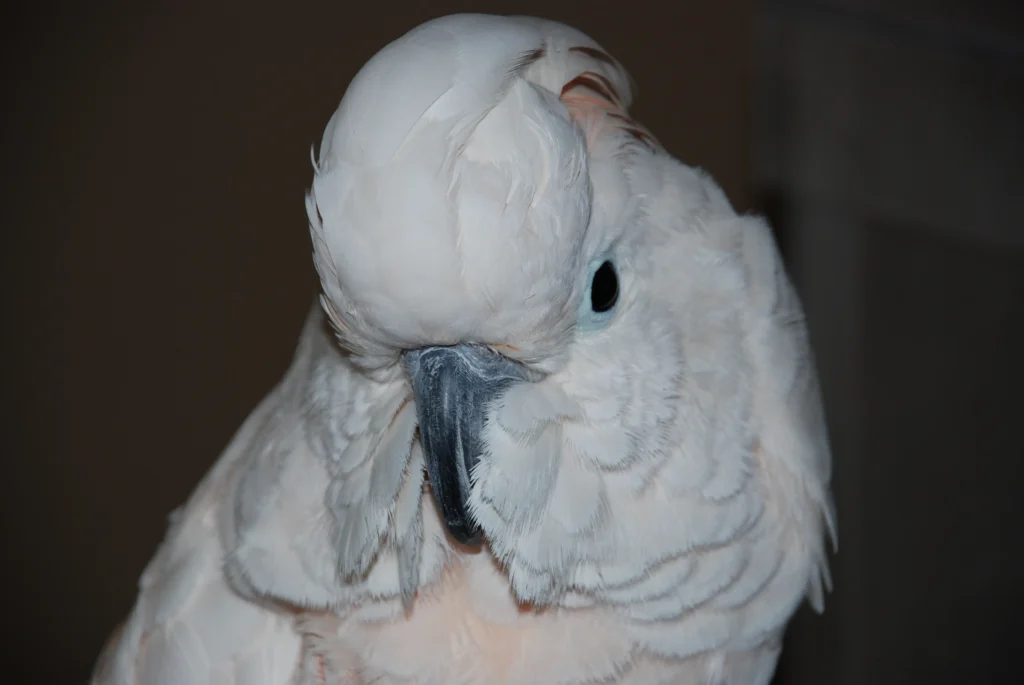
Hard Truth #3: Umbrella Cockatoo Behavior Can Be Challenging
The umbrella cockatoo parrot has a reputation for being loving and affectionate, which is true—but it’s only part of the story. The full spectrum of umbrella cockatoo behavior includes aspects that many prospective owners aren’t prepared to handle.
Understanding Umbrella Cockatoo Temperament
The umbrella cockatoo temperament is complex and multifaceted. These birds are among the most emotionally sensitive parrots, forming deep bonds with their caretakers. However, this emotional depth comes with significant challenges:
- Extreme Neediness: Umbrella cockatoos are often described as “velcro birds” due to their desire for constant companionship and attention. They may scream or engage in destructive behavior if they feel ignored.
- Mood Swings: Even well-trained umbrella cockatoos can exhibit sudden shifts in behavior, going from cuddly to aggressive without obvious warning.
- Hormonal Behavior: During mating seasons, umbrella cockatoo behavior can become especially difficult, with increased aggression, territorial displays, and excessive screaming.
- Jealousy: Many umbrella cockatoo owners report that their birds become jealous of spouses, children, or other pets, sometimes leading to biting or aggressive behavior.
The umbrella cockatoo temperament is remarkably similar to that of a perpetual toddler—they’re intelligent, emotional, and demanding of attention. However, unlike human children, they never grow out of this stage during their 60+ year lifespan.
According to research from the University of California, cockatoos rank among the most surrendered pet birds precisely because of these behavioral challenges. The university’s Parrot Wellness Program reports that many owners are simply unprepared for the emotional demands of umbrella cockatoo care.
Before considering an umbrella cockatoo for sale, potential owners should spend significant time interacting with these birds and talking to experienced umbrella cockatoo caretakers to fully understand what living with these birds entails.
Hard Truth #4: Umbrella Cockatoos Are LOUD
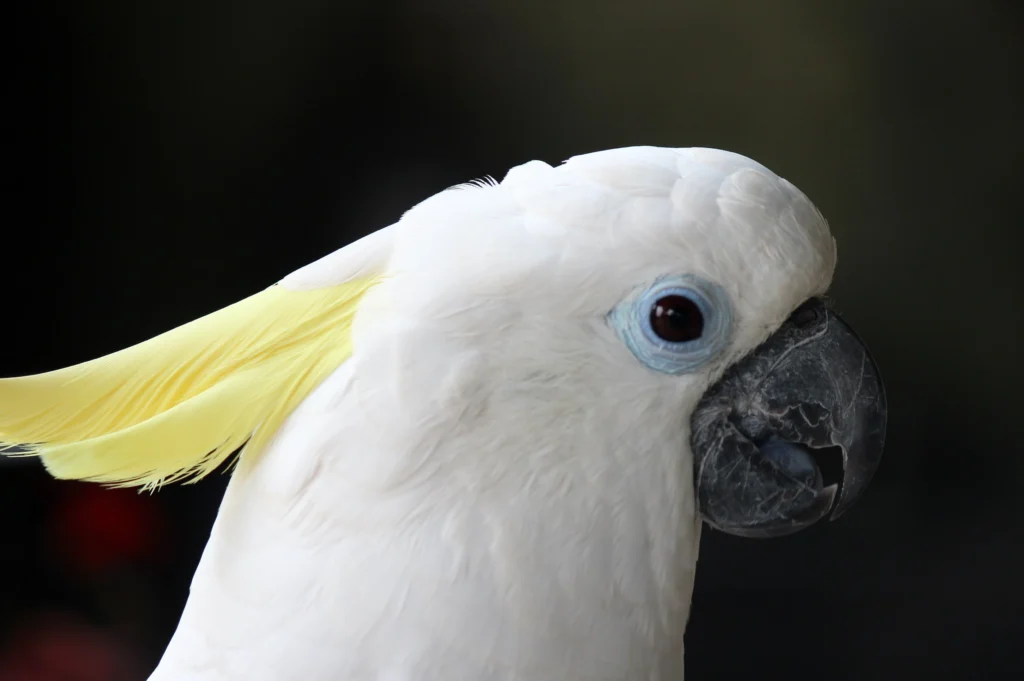
Among the most common reasons umbrella cockatoos are rehomed is their volume. The umbrella cockatoo noise level can be extreme, and no amount of umbrella cockatoo training completely eliminates their natural vocalizations.
The Reality of Umbrella Cockatoo Noise Level
All parrots are vocal, but umbrella cockatoos are particularly known for their ear-piercing screams that can reach over 135 decibels—comparable to a jet engine at close range. These vocalizations serve important purposes in the wild, allowing umbrella cockatoo parrots to communicate across large distances.
The umbrella cockatoo parrot typically vocalizes most intensely during:
- Morning and Evening: Dawn and dusk calls are natural behaviors that are virtually impossible to eliminate through umbrella cockatoo training.
- When Seeking Attention: Umbrella cockatoos quickly learn that screaming brings human attention, even if it’s negative attention.
- When Bored or Understimulated: Without proper enrichment, an umbrella cockatoo will use screaming as entertainment.
- During Hormonal Periods: Breeding season can trigger increased vocalizations as birds call for mates.
According to noise level measurements conducted by the World Parrot Trust, the umbrella cockatoo ranks among the top three loudest commonly kept parrot species, alongside macaws and other large cockatoos.
The umbrella cockatoo noise level has real-world consequences for owners:
- Neighbors in apartments or close housing may complain
- Work-from-home arrangements can become impossible
- Family members may become stressed by the constant noise
- Hearing damage is a legitimate concern with prolonged exposure
While umbrella cockatoo training can help manage some problem screaming, it cannot eliminate the bird’s natural need to vocalize. Anyone considering an umbrella cockatoo parrot must be prepared for a significantly louder household.
Hard Truth #5: Umbrella Cockatoo Care Is Time-Intensive
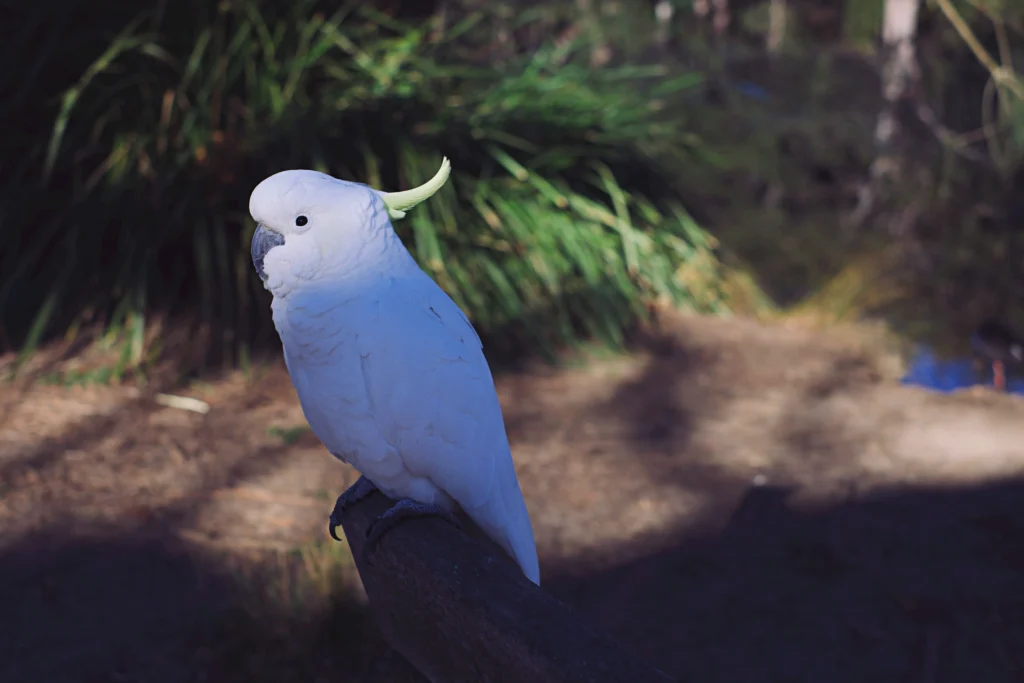
The umbrella cockatoo parrot requires a level of care that surpasses most other pets. These aren’t birds that can be left alone for extended periods or maintained with minimal interaction.
The Demands of Proper Umbrella Cockatoo Care
Daily umbrella cockatoo care routines typically include:
- Social Interaction: Umbrella cockatoos need a minimum of 3-4 hours of direct human interaction daily. This isn’t just being in the same room—it’s active engagement, umbrella cockatoo training, and one-on-one attention.
- Mental Stimulation: These intelligent birds require regular problem-solving challenges, new toys, and learning opportunities. A bored umbrella cockatoo is a destructive umbrella cockatoo.
- Physical Exercise: At least 2-3 hours outside their cage daily in a supervised, bird-safe environment is necessary for physical and mental health.
- Specialized Diet Preparation: The umbrella cockatoo diet should include a variety of fresh foods that need to be prepared daily, alongside high-quality pellets.
- Cleaning: Umbrella cockatoos are messy birds that create significant dust, scatter food, and produce waste that requires daily cleaning.
The Association of Avian Veterinarians recommends that potential owners honestly assess whether they can commit 4-6 hours daily to umbrella cockatoo care before bringing one home. This time commitment doesn’t decrease as the bird ages—it remains constant throughout the umbrella cockatoo lifespan.
Many umbrella cockatoo owners report structuring their entire lives around their birds’ needs. Vacation planning becomes complicated, work schedules may need adjustment, and social lives often revolve around accommodating the bird’s requirements.
Hard Truth #6: Umbrella Cockatoos Require Specialized Knowledge
Despite their popularity, umbrella cockatoos are not beginner birds. They require caretakers with specialized knowledge of avian health, behavior, and nutrition.
The Learning Curve of Umbrella Cockatoo Ownership
Before bringing home an umbrella cockatoo parrot, owners should become well-versed in:
- Avian Body Language: Understanding the subtle cues in umbrella cockatoo behavior is essential for preventing bites and managing stress.
- Proper Nutrition: The umbrella cockatoo diet must be carefully balanced to prevent common health issues like fatty liver disease and obesity.
- Health Monitoring: Birds hide illness until it’s advanced, making preventative care and early detection crucial.
- Environmental Hazards: From non-stick cookware to certain houseplants, a home must be thoroughly bird-proofed.
- Behavior Modification: Effective umbrella cockatoo training requires understanding of positive reinforcement techniques and avian psychology.
According to Dr. Brian Speer, a leading avian veterinarian, “The majority of health and behavioral problems we see in umbrella cockatoos stem from owners not understanding the specialized needs of these complex birds.”
Organizations like the International Association of Avian Trainers and Educators recommend that prospective umbrella cockatoo owners spend at least 6-12 months researching and interacting with these birds before purchase. This learning period is essential for understanding if an umbrella cockatoo parrot is truly right for your lifestyle.
Are Umbrella Cockatoos Good Pets? It Depends
After examining these six hard truths, the question remains: are umbrella cockatoos good pets? The answer isn’t straightforward.
The Right Owner for an Umbrella Cockatoo
Umbrella cockatoos can be wonderful companions for the right person—someone who:
- Has previous experience with large parrots
- Works from home or has a flexible schedule
- Lives in a detached home where noise won’t disturb neighbors
- Has no young children who might receive inconsistent attention from the bird
- Can commit to the bird’s needs for several decades
- Has financial stability to provide proper umbrella cockatoo care
For these individuals, the umbrella cockatoo parrot can be a deeply rewarding companion. Their intelligence, umbrella cockatoo talking abilities, and affectionate nature create bonds that many owners describe as unlike any other pet relationship.
Umbrella Cockatoo vs. Other Species
When considering an umbrella cockatoo parrot, it’s worth comparing them to other species:
- Umbrella Cockatoo vs Sulphur Crested Cockatoo: While similar in size and intelligence, umbrella cockatoos are generally considered more affectionate but equally noisy. The sulphur crested cockatoo tends to be slightly more independent.
- Male vs Female Umbrella Cockatoo: While individual personality varies, some aviculturists report that male umbrella cockatoos tend to be more consistent in temperament, while females may be more prone to hormonal mood swings. However, both require the same level of care.
- Baby Umbrella Cockatoo vs Adult: Many owners prefer to raise a baby umbrella cockatoo to form early bonds, but adult birds from umbrella cockatoo adoption programs can be wonderful pets with the advantage of established personalities.
Umbrella Cockatoo Intelligence: A Double-Edged Sword
One of the most appealing aspects of the umbrella cockatoo parrot is their remarkable intelligence. Studies have shown that umbrella cockatoo intelligence is comparable to that of a 3-5 year old human child, with the emotional development to match.
This intelligence enables impressive umbrella cockatoo talking abilities, problem-solving skills, and the capacity to learn hundreds of words and phrases. Many umbrella cockatoo owners delight in their bird’s ability to use language contextually and even create novel phrases.
However, this same intelligence creates challenges:
- Boredom: Intelligent birds require constant mental stimulation
- Manipulation: Umbrella cockatoos quickly learn which behaviors get attention
- Emotional Complexity: Their intelligence comes with emotional needs that are more complex than most pets
According to research from Harvard University, parrots like the umbrella cockatoo have neural circuits for higher cognitive functions that are similar to those of primates, despite the evolutionary distance between birds and mammals. This research underscores why these birds cannot be treated as simple pets.
Ethically Sourcing an Umbrella Cockatoo
If you’ve read this far and still believe an umbrella cockatoo parrot is right for you, sourcing your bird ethically becomes the next consideration.
Umbrella Cockatoo Adoption vs Purchase
Due to the challenges of umbrella cockatoo ownership, many of these birds need rehoming. Umbrella cockatoo adoption through rescue organizations offers several advantages:
- Adult birds with known temperaments and behaviors
- Lower costs compared to umbrella cockatoo price at commercial breeders
- Support networks through the rescue organization
- The satisfaction of providing a home for a bird in need
Organizations like BirdBrain Parrot Rescue and Phoenix Landing Foundation specialize in cockatoo rehabilitation and adoption. These groups typically provide post-adoption support and education that can be invaluable for new owners.
If seeking an umbrella cockatoo for sale from a breeder, ensure they:
- Allow you to visit their facility
- Show you the bird’s parents
- Provide health records and genetic testing
- Offer post-purchase support
- Don’t wean baby umbrella cockatoo chicks too early (before 12-16 weeks)
The World Parrot Trust maintains a database of reputable breeders committed to ethical breeding practices.
How to Tame an Umbrella Cockatoo
Whether adopting or purchasing, understanding umbrella cockatoo training fundamentals is essential. Learning how to tame an umbrella cockatoo requires patience, consistency, and respect for the bird’s boundaries.
Umbrella Cockatoo Training Basics
Effective umbrella cockatoo training involves:
- Trust Building: Begin with hand-feeding and quiet time near the cage before attempting handling
- Positive Reinforcement: Reward desired behaviors with treats, praise, or attention
- Consistency: Use the same commands and gestures for specific behaviors
- Respect: Never force interaction when the bird shows fear or aggression
- Professional Guidance: Consider consulting with an avian behaviorist for specific issues
According to Susan Friedman, Ph.D., a psychology professor specializing in applied behavior analysis, “The most successful umbrella cockatoo training programs focus on building trust and teaching the bird that it has choices.” This approach recognizes the umbrella cockatoo’s intelligence and emotional needs.
Many umbrella cockatoo behavior problems stem from fear or insecurity rather than aggression. Taking time to understand your bird’s body language and respecting its boundaries builds the foundation for a positive relationship.
Essential Supplies for Umbrella Cockatoo Care
Setting up properly for an umbrella cockatoo parrot requires significant investment in appropriate housing and supplies.
The Right Umbrella Cockatoo Cage Size
The minimum recommended umbrella cockatoo cage size is 36″ W x 24″ D x 48″ H, though larger is always better. Features to look for include:
- Bar spacing of 3/4″ to 1″
- Durable construction with stainless steel or powder-coated metal
- Multiple perches of varying diameters
- Easy-to-clean design with removable trays
- Secure locks that the bird cannot manipulate
Ideally, the umbrella cockatoo cage should be positioned in a central area of the home where the bird can feel included in family activities without being in a high-traffic area or exposed to drafts.
Umbrella Cockatoo Diet Essentials
A proper umbrella cockatoo diet includes:
- High-Quality Pellets: These should constitute 50-70% of the diet
- Fresh Vegetables: Dark leafy greens, carrots, peppers, and other vegetables provide essential vitamins
- Fruits: In moderation due to sugar content
- Healthy Nuts and Seeds: As treats and training rewards
- Fresh Water: Changed multiple times daily
According to Dr. Laurie Hess, director of pet health and nutrition at the Veterinary Center for Birds & Exotics, “Nutritional deficiencies are among the most common preventable issues we see in umbrella cockatoos. A varied diet is essential for both physical and psychological health.”
Conclusion: Is an Umbrella Cockatoo Right for You?
After examining these six hard truths about umbrella cockatoo ownership, it’s clear that these birds aren’t suitable for everyone. The umbrella cockatoo parrot is a magnificent creature that brings joy and companionship to those who can meet its extensive needs, but it can become a source of stress, financial strain, and heartbreak for unprepared owners.
If you’re still interested in umbrella cockatoo ownership after understanding the realities of umbrella cockatoo behavior, noise level, and care requirements, we recommend:
- Volunteering at a bird rescue to gain hands-on experience
- Connecting with experienced umbrella cockatoo owners through avian forums
- Finding a mentor who can guide you through the early stages of ownership
- Consulting with an avian veterinarian before bringing a bird home
- Exploring our other articles about bird care for additional information
The umbrella cockatoo parrot can be a loving, intelligent companion for those with the knowledge, resources, and lifestyle to accommodate its needs. By approaching umbrella cockatoo ownership with realistic expectations and proper preparation, you can build a rewarding relationship with one of nature’s most charismatic creatures.
Additional Resources
- Avian Welfare Coalition: Information on ethical bird ownership
- The Association of Avian Veterinarians: Find qualified avian veterinarians
- BirdTricks: Training resources for parrot owners
- Companion Parrot Quarterly: Educational magazine for bird owners
- PetsPump Bird Care Guides: Our comprehensive resources on avian care
Remember, bringing an umbrella cockatoo parrot into your home is a decades-long commitment that requires careful consideration. The umbrella cockatoo’s beauty, intelligence, and affectionate nature make them appealing pets, but only when matched with an owner who fully understands and can meet their complex needs.



